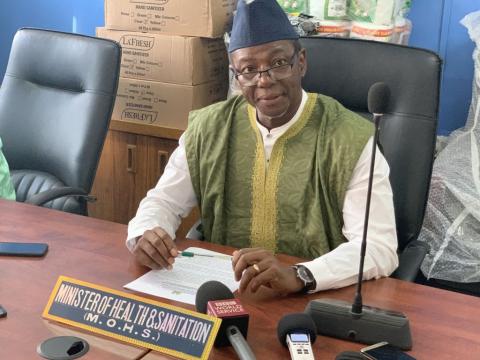By Kemo Cham
As the coronavirus edges closer to home, with Guinea having recorded a case, the Sierra Leone government has announced a raft of measures including stringent ones, while they have modified existing ones with the aim of preventing it from spilling over into the country.
Minister of Health, Dr Alpha Wurie, says they have activated the Emergency Operations Center and increased the country’s alert level to 2, the second highest, to coordinate all response measures to the disease.
The Ministry appealed to Sierra Leoneans to be extra vigilant, calling on citizens and residents who had planned overseas travels to halt them until transmission of the virus is contained abroad. The measures also call on those wanting to visit the country to do so only if absolutely necessary.
Mass gatherings are discouraged and people are advised to stop hand shaking as a way of greeting, among many other practices that are feared to be facilitating the spread of the disease.
All these measures take effect today (Monday March 16), the ministry says.
The move is part of a decision taken after a Ministerial meeting on Friday in response to the continued spread of the virus also known as COVID-19, which emanated from China late last year and has since spread to at least 118 countries as of the weekend, according to World Health Organization (WHO) figures.
"It is worrisome to note that based on current epidemiological evidence, COVID-19 is spreading to and within an increasing number of countries," Health Minister, Dr Alpha Tejan Wurie, said in a statement to journalists at the conference hall of the Ministry.
As of last week, there were over 125, 000 cases and the death figures have hit 5,000 worldwide, mainly in China and Europe. Africa had about 150 cases in 15 countries and the French territory of Reunion with the latest being Equatorial Guinea, just a day after Guinea, Sudan and Ethiopia.
The case in Guinea reported on Friday heightened concerns among Sierra Leoneans given the two countries’ close proximity.
According to reports, the patient, who originated from a European country, traveled on board an Air France plane that hopped at the Lungi Airport en route to Conakry.
Dr Wurie confirmed that the plane did transit through Lungi and said a process of locating all those passengers who disembarked in Lungi was ongoing.
Officials of the Health Ministry said despite these concerns, they were leaving no stone unturned to ensure the virus was prevented from entering, and that in the event it did, they were able to respond accordingly.
Four facilities – the 34 Military Hospital in Wilberforce, Lungi Government Hospital, Kambia Government Hospital and the Sierra Leone-China Friendship Hospital in Jui, have been designated to serve as treatment centers, Dr Wurie told journalists.
The focus at the moment, say officials, is to prevent the entry of the virus. And for this, a total of seven measures were announced. Notably, travelers arriving at any point of entry with one of three signs and symptoms – fever above 37.5 degrees, persistent cough or difficult breathing – will be mandatorily isolated for investigation and management.
The government also announced two methods of quarantine, allowing embassies and other diplomatic missions and other organizations, opting to do so, to take responsibility of quarantining their citizens or members visiting the country. All other persons will be subjected to mandatory quarantine at facilities managed by the Ministry of Health.
He said coming from countries with 50 or more confirmed COVID-19 cases would be automatically quarantined, while those from countries with less than 50 cases would not be quarantined but would have their details taken and they would be contacted throughout the 14-day period.
In a move that only fell just short of announcing a ban on international travels, the minister said if anyone must come into the country, they must be ready to be subjected to the laid down procedures.
“We strongly recommend that individuals intending to visit Sierra Leone from countries with 200 or more confirmed cases of COVID-19 should consider deferring their visits during this critical period,” said Dr Wurie, adding: “If they have very crucial or essential functions to perform in the country, they may visit but will still be quarantined as required.”
WHO on Wednesday, March 11 declared COVID-19 a global pandemic, meaning the disease had spread worldwide.
For developing countries like Sierra Leone, there have been concerns over the apparent lack of capacity to contain the virus in the event it spills over.
Copyright © 2020 Politico Online








